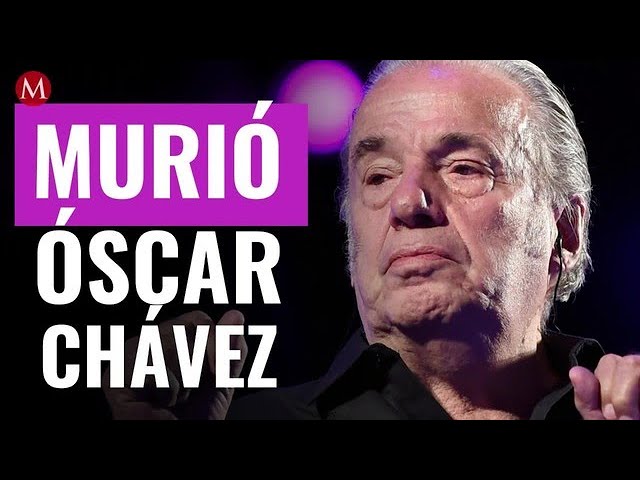A Tribute to Óscar Chávez: Remembering the Iconic Mexican Singer-Songwriter
Óscar Chávez, arguably one of Mexico’s most cherished folk musicians and activists, left an indelible mark on many hearts and the cultural tapestry of the nation. His passing in April 2020, amidst a global pandemic, seemed especially poignant. It was as though the voice of the people, for so many years, had fallen silent when it was most needed. Recognized for his powerful lyrics and soul-stirring performances, Chávez’s music resonates with the struggles and joys of everyday Mexicans.
Widely known for his commitment to social change through art, Chávez’s songs often melded humor with biting political commentary. He was never one to shy away from difficult topics, speaking through his music on issues of inequality, corruption, and the rights of indigenous peoples. His songs became anthems for various social movements and his influence can be felt in the echoes of demonstrations and celebrations across Mexico.
His unique style was a blend of traditional folk and modern protest music. With a repertoire ranging from boleros to baladas and corridos, Chávez embraced the breadth and diversity of Mexican music. Each song was a story, an evocative journey into the life of its subject, whether it was a tribute to a revolutionary hero or a tender love song infused with the rich imagery of his homeland.
Chávez’s concerts were far more than musical performances; they were gatherings of shared consciousness. Audiences would often find themselves laughing, crying, and singing along as he strummed his guitar and his voice filled the venue. His presence was all-encompassing, and he had a unique ability to connect with people from all walks of life, making his performances deeply personal experiences for those in attendance.
His legacy is now carried forward by a new generation of artists and activists who draw inspiration from his life and work. Chávez’s songs continue to be covered and reinterpreted, ensuring that his messages of hope, resistance, and love are heard by future audiences. As we remember Óscar Chávez, we not only celebrate the man and his music but also reaffirm the enduring power of song to spark change and bring people together.
Óscar Chávez’s Legacy: Inspiring Adventure and Cultural Appreciation in Mexico
Known to many as “El Caifán Mayor,” Oscar Chávez was not only a revered folk musician but also an emblematic figure of Mexico’s cultural richness. His songs, characterized by poignant lyrics and traditional melodies, paint vivid tapestries of Mexico’s landscapes and narratives, thus inspiring countless adventurers to explore the country’s diverse beauty. His musical oeuvre acted as an auditory compass that led listeners through bustling city streets, into the heart of verdant jungles, and along the sun-soaked coastlines, invigorating a deep-seated desire to journey through the very places that birthed these soul-stirring tunes.
In his beloved ballads, Chávez captured the quintessence of Mexican life, prompting adventure enthusiasts to not just witness but truly engage with the nation’s heritage. Explorers influenced by his work often find themselves delving beyond surface-level tourism, participating in local festivals, and immersing themselves in authentic cultural exchanges. The troubadour’s narratives lay groundwork for a travel ethos rooted in respect and admiration, encouraging visitors to approach their adventures through a lens of cultural appreciation, seeking meaningful connections with the people and traditions depicted in his songs.
Beyond his melodic contributions, Oscar Chávez’s activism played a crucial role in advocating for the preservation of Mexico’s history and natural wonders. His passionate defense of indigenous communities and their ancestral lands echoes in the ethos of responsible tourism. Modern-day adventurers strive to honor his legacy by prioritizing sustainable travel practices, preserving the environmental sanctuaries, and supporting local economies. Chávez’s life’s work serves as a continuous reminder that the true spirit of adventure lies not only in the thrill of exploration but also in the impactful bonds we forge with our surroundings and fellow beings.
The Impact of Coronavirus in Mexico: A Look at Óscar Chávez’s Tragic Passing
The coronavirus pandemic has left an indelible mark on the world, and Mexico has been no exception. Amidst the backdrop of this global crisis, the country faced a deeply personal loss with the passing of Óscar Chávez, an iconic figure in Mexican folk music and a beloved cultural ambassador. Chávez, known for his powerful voice and poignant lyrics, succumbed to complications related to COVID-19 on April 30, 2020, sending a wave of mourning through the nation.
Óscar Chávez’s contribution to Mexican culture was immeasurable. He was not just a musician but a storyteller whose ballads encapsulated the spirit and struggles of the Mexican people. His death came as a shocking reminder of the virus’s indiscriminate nature, cutting short the life of a man who had become the voice of many generations. The news of his passing quickly reverberated across Mexico and beyond, highlighting the pandemic’s growing reach and severity.
The loss of Chávez resonated deeply with fans and fellow artists. Social media platforms were flooded with tributes and memories, as people shared how his music had touched their lives. Musicians from across genres and generations cited Chávez as an influence, underscoring his role in shaping the Mexican musical landscape. The virtual memorials served as a testament to his enduring legacy and the collective sense of grief felt by his admirers.
In the face of such a tragedy, the Mexican government and health officials urged the public to honor Óscar Chávez’s memory by adhering to safety protocols and measures intended to curb the spread of the coronavirus. His passing became a rallying cry for many to take the pandemic more seriously, acknowledging that no one, regardless of status or contribution to society, was immune to the threat posed by the virus.
As Mexico, and the world at large, continue to navigate the challenges brought about by the pandemic, the cultural landscape feels starkly altered without the presence of Óscar Chávez. While his music lives on, his absence is a poignant reminder of the personal and collective losses sustained during these unprecedented times. Chávez’s voice, once a source of comfort and resilience, now serves as a haunting echo of the pandemic’s far-reaching consequences.
Exploring the Vibrant Mexican Music Scene in Memory of Óscar Chávez
Mexico’s diverse music scene is a colorful tapestry that reflects the country’s rich cultural heritage. In the wake of the legendary troubadour Óscar Chávez’s passing, there’s been a resurgent interest in exploring traditional and contemporary Mexican sounds. Chávez, known for his powerful folk melodies and socially conscious lyrics, left behind an indelible mark that has inspired countless listeners to delve deeper into Mexico’s musical roots. This journey takes us through the bustling streets of Mexico City to the intimate cantinas where mariachis play, and to the lively festivals that celebrate the country’s musical diversity.
The influence of Chávez is palpable in places like Coyoacán, a bohemian neighborhood where artists and musicians converge. Here, one can experience live performances that encapsulate the spirit of Mexican folk music, often infused with modern twists. Peñas, informal gatherings of musicians and audiences, remain popular venues for tribute acts and rising stars to reinterpret Chávez’s classics, connecting the past with the present. Such interactions not only preserve his legacy but also foster the growth of a new generation of performers who continue to innovate within Mexico’s eclectic music scene.
A cornerstone of Mexican culture, the music scene continues to thrive and evolve. From the heartrending ballads of ranchera to the foot-tapping rhythms of norteño and the revolutionary zeal of nueva canción, each genre offers a unique window into the nation’s soul. Óscar Chávez was a master at capturing these nuances, and his songs continue to echo throughout the country, a testament to the enduring power of music to unite and express shared experiences. As we celebrate his life, we also celebrate the rich and vibrant sounds of Mexico, a harmonious blend of history, emotion, and social commentary that resonates around the world.
Óscar Chávez’s Contribution to Folk Music: A Journey Through Mexico’s Rich Traditions
When one explores the panoramic musical landscape of Mexico, the name Óscar Chávez often reverberates with the resonance of cultural significance and folkloric passion. His contribution goes beyond mere performance; it is an embodiment of Mexico’s rich traditions, storytelling, and the vivid tapestry of historical events that have shaped the nation. Chávez, who was affectionately dubbed “El Caifán Mayor”, infused his music with social commentary and an earnest representation of the Mexican identity, which has echoed through decades and continues to influence many.
Chávez’s musical journey is reflective of a deep connection with the heart of Mexico’s folk music. Drawing from a vast array of regional styles such as the corridos (narrative ballads), rancheras (country music), and boleros (romantic tunes), he curated an eclectic repertoire that celebrated diversity while unifying listeners under a common appreciation for tradition. Through his evocative lyrics and soulful renditions, Chávez did not just sing; he told stories that captured the essence of the Mexican spirit, connected people with their roots, and painted an auditory picture of Mexico’s collective memory.
For many, Óscar Chávez’s music is a vehicle of cultural preservation. His detailed explorations of indigenous sounds and instruments, coupled with his commitment to the diffusion of folk music, have played a crucial role in keeping regional Mexican music genres alive and in the public ear. His concerts were not merely performances; they were experiences that brought to life the stories and struggles of Mexico’s past and present, allowing his audience to not only hear but feel the history and breadth of the country’s folklore, thus securing his legacy as an inimitable ambassador of Mexican culture.


